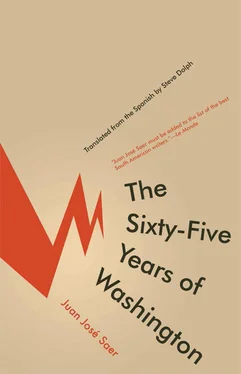Juan José Saer - The Sixty-Five Years of Washington
Здесь есть возможность читать онлайн «Juan José Saer - The Sixty-Five Years of Washington» весь текст электронной книги совершенно бесплатно (целиком полную версию без сокращений). В некоторых случаях можно слушать аудио, скачать через торрент в формате fb2 и присутствует краткое содержание. Год выпуска: 2010, Издательство: Open Letter, Жанр: Современная проза, на английском языке. Описание произведения, (предисловие) а так же отзывы посетителей доступны на портале библиотеки ЛибКат.
- Название:The Sixty-Five Years of Washington
- Автор:
- Издательство:Open Letter
- Жанр:
- Год:2010
- ISBN:нет данных
- Рейтинг книги:3 / 5. Голосов: 1
-
Избранное:Добавить в избранное
- Отзывы:
-
Ваша оценка:
- 60
- 1
- 2
- 3
- 4
- 5
The Sixty-Five Years of Washington: краткое содержание, описание и аннотация
Предлагаем к чтению аннотацию, описание, краткое содержание или предисловие (зависит от того, что написал сам автор книги «The Sixty-Five Years of Washington»). Если вы не нашли необходимую информацию о книге — напишите в комментариях, мы постараемся отыскать её.
The Sixty-Five Years of Washington — читать онлайн бесплатно полную книгу (весь текст) целиком
Ниже представлен текст книги, разбитый по страницам. Система сохранения места последней прочитанной страницы, позволяет с удобством читать онлайн бесплатно книгу «The Sixty-Five Years of Washington», без необходимости каждый раз заново искать на чём Вы остановились. Поставьте закладку, и сможете в любой момент перейти на страницу, на которой закончили чтение.
Интервал:
Закладка:
— On top of that, Tomatis says, do not forget that by then the beer and the white wine were beginning to take effect.
Not in Washington, of course, he clarifies, but Beatriz and Silvia are not ones to shy from the bottle. And Cuello, forget it — unfortunately his congenital populism blooms once he’s put back a few glasses, and it ends up being impossible to dissuade him from his fixed idea that the best way to fill the silence at a party is with folklore. Pirulo, on the other hand, is an evil drunk and likes to get in fights — he, Tomatis, can understand the resentment of someone who has nothing but American sociology to help him deal with reality. Early in the morning, he doesn’t remember why anymore, Pirulo had started exchanging blows with Dib, and he and Pichón had to go and separate them — Dib and Pirulo, who had been such good friends in school and claimed to have mobilized between them the entire Rosarian student body in ’59. You can see, Tomatis suggests, why living with Pirulo makes Rosario look for comfort at the end of a needle. What happened was they found them punching each other at the back of the patio — Dib had blood running from nose and bloody stains on his sweater. As soon as he, Tomatis, no? and Pichón looked away, they had started again: Dib had Pirulo by the hair and was dragging him across the patio, between the mandarins. Finally Barco, who’s like two meters tall, had to separate them. Between the three of them they pushed Dib and Pirulo to the bathroom and made them wash their faces, all of this in low voices, whispering so that the people under the pavilion wouldn’t notice. Which failed, of course, and two minutes later he, Tomatis, no? Pichón, Pirulo, Dib, Barco, Basso, Nidia Basso, Rosario, and Botón were all in the bathroom, yelling at each other in what they imagined were low voices. Basso wanted to kick them out, but Nidia intervened on their behalf; Rosario was shaking her head and not saying anything, staring at Pirulo with a look that more or less said, You had to make a scene again ; and Botón, who only an hour before had tried to rape La Chichito, was acting like Dib and Pirulo’s behavior was a personal insult to Washington. Don’t let Washington find out, please , he was saying melodramatically, when a minute earlier La Chichito, all disheveled, had come crying under the pavilion, holding up her skirt because Botón had broken its zipper. He had gotten the idea, Tomatis recalls, that Dib and Pirulo had to give each other a conciliatory hug, an idea thoroughly in Botón’s style, and if you needed further proof that Botón and reality were entities of a contradictory nature, he insisted on volunteering this genteel exhortation while everyone else, divided into two groups, was making a superhuman effort to hold back Dib and Pirulo, who had been glaring at each other during the reconciliation and at the slightest distraction started hitting each other again. Finally the whole thing ended when. .
Abruptly, Tomatis cuts off his story and stops so unexpectedly that Leto and the Mathematician take two or three more steps before stopping too, noticing when they turn around that Tomatis, in the middle of the street, is surveying, with a worried look, the trajectory they have just traveled together, as though he were measuring the distance. In fact, since they left the entrance to the newspaper, they have covered three blocks, and after crossing, with some difficulty, the cause of the bottleneck at the first intersection and continuing easily in the middle of the street thanks to the absence of cars, they’ve crossed two more intersections without paying any attention at all, Tomatis concentrating on his story, and the Mathematician and Leto on the somewhat awkward reproach the story causes them to feel. Guessing the distance, a more and more scornful expression takes over Tomatis, whose gaze, which has become sullen and evasive, deliberately avoids meeting Leto’s and the Mathematician’s. A bitter, humiliating thought, unexpected and scattered, overwhelms him when he realizes that, absorbed in the details of his story, he has let himself be dragged three blocks, something along the lines of, as if they didn’t know that everything is going to, that I’m going to, that sooner or later the whole universe is going —no? — as if they didn’t know, and worse still if they don’t know it, coming along and asking me to sign up for this senseless adventure, walking three blocks with them and telling them about Washington’s birthday , a thought painted so clearly on his face that the Mathematician who, out of respect for what you might call Tomatis’s hypothetical strength of character, has been trying to intercept his gaze, gives up and, just the opposite, admitting defeat, tries to give him an opportunity to excuse himself.
— Maybe we’re taking you too far from the paper, he offers.
Not taking part, somewhat indifferently, in such a delicate situation, Leto has started thinking, It could be that he had an incurable illness, like she insists, but the most important symptom isn’t the cellular degeneration but the act of lifting the revolver in his hand and pressing the barrel to his temple .
— Everyone at the paper, says Tomatis, from the editor down to the very last sports reporter, and most of all the editor, and most of all the very last sports reporter, can suck my ass — which translates, the Mathematician imagines, if he has understood correctly, into more or less the following: the paper doesn’t have anything to do with this, and it’s out of delicacy and so I don’t get twisted up in neutered discussions that I don’t point out the ones actually responsible . And all because of the scattered and nameless pressure of the menace, of the turbulences in the neutral, which in a single stroke, through unexpected coincidences of flesh and scent, unhinges and tears apart! For a few seconds they remain motionless — motionless, why not, no? — if you leave aside, and it’s worth asking why, the cohesion, to put a word to it, of what are apparently called atoms, the, if there are no objections, cellular activity or the so-called circulation of blood, the supposed muscular effort, the magnetic disturbances surrounding them, the continuous flow of light, the imperceptible drift of the continents, the so-called terrestrial revolution and rotation, the general gravitational force, as the papers have it, and including, if you bear in mind the latest issues of the specialized journals, the expansion or, depending on how you look at it, collapse of what they call the universe, motionless, ultimately, if we accept, having come this far, the word, unsatisfactory of course the more you keep at it, when, on second thought, the motionless would be, rather, a whirlwind or a stationary stampede — motionless, then, as yours truly, no? or better yet — in a word, or in two better yet, to be more precise: every thing.
And like that they separate. Shaking his head a little next to two bent fingers along his temple as though he were taking a mental note, with a look that said, if I don’t make you pay for this it’s because I’m not begrudging , Tomatis, without conceding any other sign of farewell, turns around and starts walking toward the newspaper. Corpulent and dark, somewhat strange in the morning sun, he seems to be reconstructing, while he moves away with an uneven keel, a kind of imaginary dignity that the encounter with Leto and the Mathematician had displaced. Leto observes him, more distracted than relieved, asking himself, without realizing it, now that Tomatis has shaken them loose, how he, Leto, can likewise shake off the Mathematician. His indifference toward Tomatis’s abrupt and humiliating departure is nothing but a modest revenge for the fleeting complicity between Tomatis and the Mathematician who, a few moments earlier, had kept him on the periphery of the aura they radiated. The Mathematician, after shaking his head lightly for a few seconds, turning resolutely toward him, seems to consider the incident finished.
Читать дальшеИнтервал:
Закладка:
Похожие книги на «The Sixty-Five Years of Washington»
Представляем Вашему вниманию похожие книги на «The Sixty-Five Years of Washington» списком для выбора. Мы отобрали схожую по названию и смыслу литературу в надежде предоставить читателям больше вариантов отыскать новые, интересные, ещё непрочитанные произведения.
Обсуждение, отзывы о книге «The Sixty-Five Years of Washington» и просто собственные мнения читателей. Оставьте ваши комментарии, напишите, что Вы думаете о произведении, его смысле или главных героях. Укажите что конкретно понравилось, а что нет, и почему Вы так считаете.












